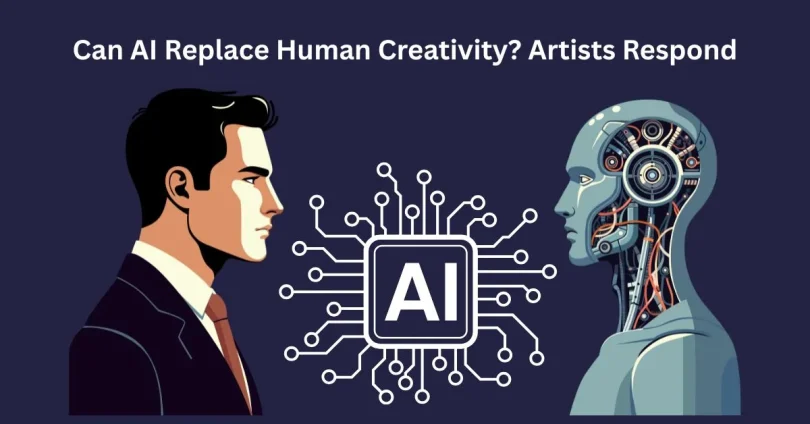Technology keeps transforming our lives with new features that come with ease and efficiency. AI development introduced human reactions to computer programs. We can generate audio, video, images, and content with a few details and a click of a button, and make it sound like it was generated by a human and not an AI bot.
However, has artificial intelligence become smart enough to substitute our cognitive and creative abilities?
This is an important question for creative activities like painters, artists, content creators, and even philosophers.
The Emergence of AI Art
Artificial intelligence (AI) applications such as DALL•E, Midjourney, and RunwayML can generate beautiful images within a few seconds. Authors are writing with the help of ChatGPT, and composers are testing AI-generated music. The boundary between artificial and human art is becoming thin.
AI works/draws on thousands of previous works, patterns, styles, and trends. That is, it copies creativity instead of creating it.
What Artists/Experts are Saying
“It’s a tool, not a threat.”
Many artists see AI as just another tool in the creative toolbox, like a paintbrush or synthesizer. Digital artist Sofia Leclerc says, “AI helps me prototype ideas faster. It’s like having a supercharged assistant. But the real emotion, the message, I still craft that myself.”
“It lacks soul.”
Painter and illustrator Marco Viteri argues, “There’s a difference between generating a pretty image and creating something that tells a human story. AI can mimic style, but it doesn’t know heartbreak, joy, or struggle. That’s where human creativity lives.”
“We’re entering a remix culture.”
Filmmaker Lena Torres says, “Artists have always built on what came before, just like AI. What’s new is the speed and access. It’s not about replacement; it’s about how we collaborate with machines to push boundaries.”
Where AI Falls Short
AI is good at content creation, but it’s still limited when it comes to…:
Intent and purpose: It does not create with an intent or emotion in mind.
Cultural nuance: It is unable to comprehend the shades of living experiences.
Innovation: Real creativity can be a matter of breaking the rules, which AI is not so good at without human input.
Then, can AI substitute human creativity?
Short answer: No, but it will transform it.
AI can improve and motivate, but it cannot feel. It lacks childhood memories, emotional scars, and personal dreams. Those are the things that drive genuine, reverberant creativity.
Human creativity is not going away as long as we appreciate storytelling, emotion, and originality.
Here are five considerate answers of artists, and each of them contributes a different angle to the question of whether AI can replace human creativity.
Industry Voices Weigh In
Here’s what prominent artists, researchers, and critics say about AI and creativity:
“AI’s creative output is mainly drawn from existing works, most of the data is below average or substandard, so that AI will take stuff from that.”
Javed Akhtar, veteran lyricist & screenwriter
Source: NDTV
“Human involvement in the creative process remains essential, as today’s AI still cannot replicate the decision-making behind true artistic expression.”
Anne Ploin, researcher at Oxford Internet Institute
Source: The Conversation
“AI isn’t a threat, but a new artistic medium; a supercharger rather than a replacement.”
Dahlia Dreszer, Panamanian photographer & AI artist
Source: ArtReview
“AI is far from capable of writing complete songs or meaningful lyrics, but it’s a valuable co-creative partner like an additional songwriter in the room.”
Björn Ulvaeus, ABBA member & songwriter
Source: BBC
“AI music lacks human pain; it doesn’t have a soul. That emotional foundation of songwriting can’t be faked.”
Nick Cave, musician & lyricist
Source: The Guardian
“AI-generated music lacks the spirit and cultural depth of human-made tracks.”
Japanese, American & Peruvian-American artists
Source: Pitchfork
“AI will not replace humans, but those who use AI will replace those who don’t.”
Ginni Rometty, Former CEO of IBM
Source: Time Magazine, Parametric Architecture
Final Thoughts
Human creativity isn’t just about generating ideas; it’s about emotion, life experiences, cultural meaning, and the spark of intuition. As artists and experts have emphasized, AI can speed up the process, offer new tools, or even act as a creative co‑pilot, but it still can’t feel, can’t dream, and can’t originate emotion‑driven creativity on its own. While AI enhances creative possibilities, it still can’t replicate the emotion and intent behind human-made work.
In the end, the real creative power still lies with us. The future is in the hands of those artists who can combine AI tools and human vision, machine and intuition.
Wish to be on top? Learn how to trigger AI with emotional purpose, negotiate ethical protection such as fair pay and openness, and work in hybrid creative processes. The most thrilling period of creative innovation is yet to come.
FAQs
Can AI fully replace human creativity?
No. While AI is powerful at pattern recognition and recombination, it lacks emotional depth, personal experience, and cultural context, which are critical components of human creativity.
How does AI support creative work?
AI can generate ideas, automate formatting and repetitive tasks, overcome creative blocks, and help democratize access to creative tools, even for those without formal training.
What limitations does AI face in creative fields?
AI depends on existing datasets, cannot feel emotions, and lacks moral or cultural understanding, making originality and authenticity hard to replicate.
Will AI eliminate creative jobs or just change them?
Most experts say jobs will evolve, not evaporate. AI may handle technical tasks, but human creatives remain essential for narrative, judgment, emotional insight, and artistic relevance.






Leave a Comment